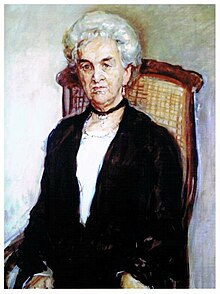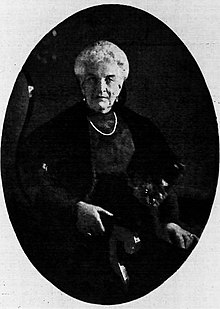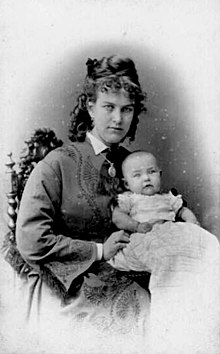Ida Boy-Ed


Ida Boy-Ed , born Ida Cornelia Ernestina Ed , (born April 17, 1852 in Bergedorf ; † May 13, 1928 in Lübeck-Travemünde ) was a German writer and salonnière .
Life
Ida Ed was born as the daughter of a member of the Reichstag, library owner, journalist and editor of the Eisenbahn-Zeitung (forerunner of the Bergedorfer Zeitung ) Christoph Marquard Ed and his wife Friederike Amalie Pauline, née. Strange, born. At the age of 17, she married the merchant Karl Johann Boy in 1870. She became the mother of three sons ( Karl , Walther and Emil) and a daughter. After leaving her husband, she moved to Berlin with her eldest son in 1878. There she worked as a journalist and wrote novels. She also maintained a lively correspondence with artists of the time. In 1880 she was forced to return to her husband in Lübeck, who refused to consent to the divorce.
Ida Boy-Ed wrote over 70 novels and volumes of short stories and had a lasting influence on the cultural life of Lübeck with her Lübeck Salon . After the publication of Buddenbrooks in 1901, she supported the young Thomas Mann . In the same way, together with her friend Lilly Dieckmann , she promoted the conductors Wilhelm Furtwängler and Hermann Abendroth during his time in Lübeck.
On her 60th birthday, April 17, 1912, the Senate of the Hanseatic City of Lübeck granted her permanent right to live in the apartment in the customs office next to the castle gate , in which she lived until the end of her life , as thanks for her services to the city . When Thomas Mann visited Lübeck, he resided in his sponsor's apartment.
In Hamburg-Bergedorf and Lübeck's old town ( Ida-Boy-Ed-Garten ) streets are named after her. Her grave is in the Lübeck Burgtorfriedhof .
First World War
“[…] I have spoken to many, many women: tame women whom I previously thought were limited, and they were clear and strong in hatred; delicate ones who were employed only for me, and now their hatred made them forget themselves; childless, who had long since been devoted, and who now complained: If only I had a son to take revenge on England; Mothers who have no luck in the world other than that through their sons: they gave it joyfully, and they could no longer say joyfully: For the fatherland or out of hatred of England. "
In the Battle of the Marne her son was Walther Boy Ed , captain in the 2nd Guards Field Artillery Regiment , near Nauroys severely wounded and died on September 23, 1914 military hospital near Reims being wounded. Her second son, Karl Boy-Ed , spied as a frigate captain and naval attaché in the USA until he was expelled in 1917 . Until the end of the war he worked in the press office of the Navy Ministry. The third son, Emil Boy-Ed, served during the war as a lieutenant captain in the reserve on various torpedo boats and from 1918 as the head of an escort flotilla in the North Sea.
In the Weltbühne on November 24th, 1925, from the contribution Memories of a Great Time , written by Hellmut von Gerlach, it says: “And the famous writer Boy-Ed not only stated in the magazine of the 'German Association for Women's Suffrage' that she feels 'sudden terrible hatred' for England, she also calls on women in general to this 'holy hatred', yes she admonished the German seafarers to 'be tough on women and children too, if they belong to English men'. "
Works (selection)
- A drop. Novella. Hamburg 1882
- Clouded happiness. Novella. 1883
- Men of time. Novel. 3 volumes. 1884
- His fault. Novel. 2 volumes. 1885
- Crowns of thorns. Novel. Rudolf Waldern, Berlin 1886
- The untried. Novel. Reissner, Leipzig 1886
- Abyss of life. Novellas. 1887
- Masks. Novel. 1887 [New arrangement and title Die Glücklichen , 1916]
- I. Novel. ?, Stuttgart / Leipzig / Berlin 1888
- Fanny Forester. Novel. ?, Stuttgart 1889
- A lie? Novel. 1889
- Not on the track. Novel. 2 volumes in one volume. Reissner, Leipzig 1890
- From Tantalus' family. Novel. 2 volumes. 1891
- Painter stories. Psychological studies. 1892
- Leah and Rachel. Novel. 1892
- Up! Novel. ?, Berlin 1892
- A child. Novella. Reissner, Leipzig 1892
- Last laughed and other novels. 1893
- Storm. Novellas. ?, Breslau 1894
- Seven swords. Novel. 1894
- The sister. Novel. 1894
- Become a woman. Novel in 2 volumes. Carl Reissner, Dresden / Leipzig 1894
- Novellas. 1894
- X. novel. 1896
- The lamp of the psyche. Novel. 1896
- Nothing. Novel. 1897
- A pure soul. Novel. 1897
- A critical moment , a cross-bearer. Novellas. 1897
- The sinner. Novel. 1898
- The escape. Novel. 1898
- The debtor. Novel. 1899
- Two men. Novel. 1899
- Just human. Novel. 1900
- About Helena. Novel. 1901
- From a cradle. A novel from Hanseatic family life. 1901
- The sowing hand. Roman, Cotta , Stuttgart 1902
- The ABC of life. Roman, Velhagen & Klasing, Bielefeld / Leipzig 1903
- The big voice. Novellas. 1903
- Homecoming fever. Novel from the life of a naval officer. 2 vol., J. Engelhorn, Stuttgart 1904
- The chains. Novel. Velhagen & Klasing, Bielefeld / Leipzig 1904
- The fortress garden. Novel. Velhagen & Klasing, Bielefeld / Leipzig 1905
- A boon. Novel. 1906
- To a woman. Novel. 1906
- The lovely fool novel in 2 volumes. 1907
- Almost an eagle. Novel. 1907
- An echo. Novel in 2 vol. J. Engelhorn, Stuttgart 1908
- Stories from the Hanseatic City. Franz Moser Nachf., Leipzig / Berlin [1909]
- Nothing about me !. Roman, Engelhorn, Stuttgart 1910
- A royal merchant. Hanseatic novel. Cotta, Stuttgart / Berlin 1910
- Hardy von Arnberg's ordeal. Novel in 2 vol., J. Engelhorn, Stuttgart 1911
- A moment in paradise. Novel. Ullstein , Berlin 1912
- Charlotte von Kalb . A psychological study. With 8 illustrations, Eugen Diederichs, Jena 1912
- A woman like you! Novel. Ullstein, Berlin 1913
- Silent heroes. Novel. Cotta, Stuttgart / Berlin 1914
- The fatherland's cooking pot. Scherl, Berlin [1914]
- Before marriage. Novel. Ullstein, Berlin / Vienna 1915
- The martyrdom of Charlotte von Stein . Attempt to justify them. Cotta, Stuttgart / Berlin 1916
- The offering bowl. Novel. August Scherl , Berlin 1916
- Only those who know longing ... Roman. Cotta, Stuttgart / Berlin 1916
- Opened gates. Novel. Ullstein, Berlin / Vienna 1917
- To a woman. Novel. Paul Franke, Berlin, around 1920
- From the family of Tantalus. Novel. Philipp Reclam jun., Leipzig, around 1920
- Shine. Novel. August Scherl, Berlin 1920
- Germaine of Stael . A book on the occasion of her ... , Cotta, Stuttgart / Berlin 1921
- Crumbs. Novellas. German book workshops, Dresden 1922
- Almost an eagle. Novel. Reissner, Leipzig 1922
- Anna's marriage. Novel. Engelhorn, Stuttgart 1923
- The one. Novel. August Scherl, Berlin 1924
- The escape. Novel. Paul Franke, Berlin around 1925
- Yesterday and tomorrow. Novel. August Scherl, Berlin 1926
- From old and new days. Novellas. Cotta, Stuttgart 1926
- Vengeance is mine. History from the Hanseatic city. 1931
literature
- Ernst Alker : Boy-Ed, Ida Cornelia Ernestine. In: New German Biography (NDB). Volume 2, Duncker & Humblot, Berlin 1955, ISBN 3-428-00183-4 , p. 495 ( digitized version ).
- Elsa Dreyer: Unforgotten women (...) Ida Boy-Ed. In: Lichtwark No. 9, August 1949, Ed .: Lichtwark Committee, Bergedorf. See now: Verlag HB-Werbung, Hamburg-Bergedorf. ISSN 1862-3549
- Thomas Mann : Letters to Otto Grautoff (1894–1901) and Ida Boy-Ed (1903–1928). Ed .: Peter de Mendelssohn . Fischer, Frankfurt am Main 1975.
- Cornelia Saxe: Ida Boy-Ed. In: Britta Jürgs (Ed.): Because there is nothing left as nature intended. Portraits of women artists and writers around 1900. AvivA Verlag, Berlin, 2001, ISBN 3-932338-13-8 , pp. 193–215.
- Gabriele Wagner-Zereini: The woman at the window. On the development of a female spelling using the example of the Lübeck writer Ida Boy-Ed (1852–1928). Dissertation Univ. Frankfurt am Main 1999.
Web links
- Literature by and about Ida Boy-Ed in the catalog of the German National Library
- Newspaper article about Ida Boy-Ed in the 20th century press kit of the ZBW - Leibniz Information Center for Economics .
- Works by Ida Boy-Ed at Zeno.org .
- Works by Ida Boy-Ed in the Gutenberg-DE project
- Short biography and bibliography of Barbara Niemeyer
- biography
- NEWW Women Writers
Individual evidence
- ↑ Christoph Marquard Ed
- ↑ among others from Edlef Köppen : Army report
- ↑ Lübeck City Archives and Lübecker General-Anzeiger from September 25, 1914.
| personal data | |
|---|---|
| SURNAME | Boy-Ed, Ida |
| ALTERNATIVE NAMES | Ed, Ida Cornelia Ernestina (maiden name) |
| BRIEF DESCRIPTION | German writer |
| DATE OF BIRTH | April 17, 1852 |
| PLACE OF BIRTH | Bergedorf |
| DATE OF DEATH | May 13, 1928 |
| Place of death | Lübeck-Travemünde |




